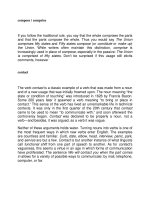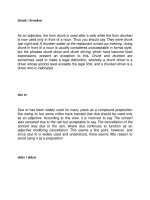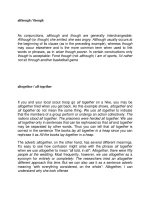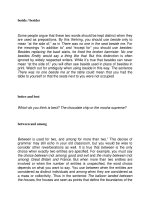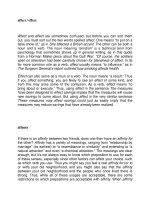Tài liệu Cách dùng tiếng Anh P6 doc
Bạn đang xem bản rút gọn của tài liệu. Xem và tải ngay bản đầy đủ của tài liệu tại đây (61.55 KB, 7 trang )
drunk / drunken
As an adjective, the form drunk is used after a verb while the form drunken
is now used only in front of a noun. Thus you should say They were drunk
last night and A drunken waiter at the restaurant ruined our evening. Using
drunk in front of a noun is usually considered unacceptable in formal style,
but the phrases drunk driver and drunk driving, which have become fixed
expressions, present an exception to this. Drunk and drunken are
sometimes used to make a legal distinction, whereby a drunk driver is a
driver whose alcohol level exceeds the legal limit, and a drunken driver is a
driver who is inebriated
due to
Due to has been widely used for many years as a compound preposition
like owing to, but some critics have insisted that due should be used only
as an adjective. According to this view, it is incorrect to say The concert
was canceled due to the rain but acceptable to say The cancellation of the
concert was due to the rain, where due continues to function as an
adjective modifying cancellation. This seems a fine point, however, and
since due to is widely used and understood, there seems little reason to
avoid using it as a preposition
elder / eldest
Elder and eldest generally apply to persons, unlike older and oldest, which
also apply to things. Elder and eldest are used principally with reference to
seniority: elder sister, elder statesman, John the Elder
elicit / illicit
You may elicit guffaws if you confuse these two. Elicit is a verb meaning “to
bring or draw out something that is latent or potential,” as in Duke Ellington
elicited some amazing sounds from his band. By extension you can elicit a
truth or principle, as from a discussion or inquiry. Elicit can also mean “to
call forth a reaction,” of which a guffaw is a good example. Illicit, on the
other hand, is an adjective meaning “unlawful,” as in money acquired by
illicit means
equable / equitable
Don’t lose your equanimity over these look-alikes. Equable means “steady,
unvarying,” as in an equable climate. It is often extended to mean
“unflappable, serene,” as in an equable disposition. Equitable means
“characterized by equity, fair”: an equitable distribution of gifts among the
children
equal
Some people say that equal is an absolute term, that is, that two quantities
either are or are not equal and that equal therefore cannot be qualified in
degree. Accordingly, it is illogical to speak of making a more equal
allocation of resources among the departments. But in an earlier survey 71
percent of the Usage Panel accepted this example. Was the panel being
illogical?
People who object to the more equal usage assume that mathematics and
logic provide a model of accuracy that is appropriate to the everyday use of
language. This supposition also underlies traditional grammatical
discussions of other words, such as unique, parallel, and center. According
to this account
escape
Traditionally, escape is used with from when it means “break loose” and
with a direct object when it means “avoid.” Thus we might say The forger
escaped from prison by hiding in a laundry truck but The forger escaped
prison when he turned in his accomplices in order to get a suspended
sentence. In recent years, however, escape has been used with a direct
object in the sense “break free of”: The spacecraft will acquire sufficient
velocity to escape the Sun’s gravitational attraction. This usage is well
established and should be regarded as standard.
everyplace / anyplace / someplace / no place
The forms everyplace (or every place), anyplace (or any place), someplace
(or some place), and no place are widely used in speech and informal
writing as equivalents for everywhere, anywhere, somewhere, and
nowhere. These usages may be well established, but they are not normally
used in formal writing. However, when the two-word expressions every
place, any place, some place, and no place are used to mean “every (any,
some, no) spot or location,” they are entirely appropriate at all levels of
style
exceptionable / exceptional
Exceptionable and exceptional are not interchangeable. Only exceptionable
means “objectionable” or “debatable”: The teachers were relieved to find
nothing exceptionable in the student newspaper Exceptional means
“uncommon” or “extraordinary”: That student has an exceptional memory.
fact
Fact has a long history in the sense “allegation of fact,” as in “This tract was
distributed to thousands of American teachers, but the facts and the
reasoning are wrong” (Albert Shanker). This practice has led to the
introduction of the phrases true facts and real facts, as in The true facts of
the case may never be known. These usages may cause qualms among
critics who insist that facts can only be true, but the usages are often useful
for emphasis. And that’s a true fact.
farther / further
Is it the further you get in your trip, the farther you get in your book or the
other way around? Many writers since the Middle English period have used
farther and further interchangeably. A relatively recent rule, however, states
that farther should be reserved for physical distance and further for
nonphysical, metaphorical advancement. Thus 74 percent of the Usage
Panel prefers farther in the sentence If you are planning to drive any farther
than Ukiah, you’d better carry chains, whereas 64 percent prefers further in
the sentence We won’t be able to answer these questions until we are
further along in our research. In many cases, however, it is hard to see the
difference. If we speak of a statement that is far from the truth, for example,
we should also allow the use of farther in a sentence such as Nothing could
be farther from the truth. But Nothing could be further from the truth is so
common that it has become a fixed expression
fewer / less
The traditional rule says that you should use fewer for things that can be
counted (fewer than four players) but less with mass terms for things of
measurable extent (less paper, less than a gallon of paint). But people use
less in certain constructions where fewer would occur if the rule were being
followed. You can use less than before a plural noun that denotes a
measure of time, amount, or distance: less than three weeks, less than
$400, less than 50 miles. You can sometimes use less with plural nouns in
the expressions no less than and or less. Thus you can say No less than
30 of his colleagues signed the letter and Give your reasons in 25 words or
less
finalize
Even though finalize has been around since the early 1920s, people still
object to it because they associate it with the language of bureaucracy.
Seventy-one percent of the Usage Panel finds unacceptable the sentence
We will finalize plans for a class reunion. Although finalize has no single
exact synonym, you can always find a substitute among complete,
conclude, make final, and put into final form
firstly
Both first and firstly are well established to begin an enumeration: Our
objectives are, first (or firstly), to recover from last year’s slump. Whichever




